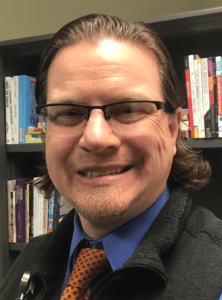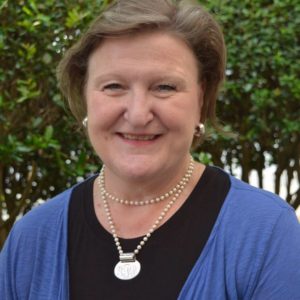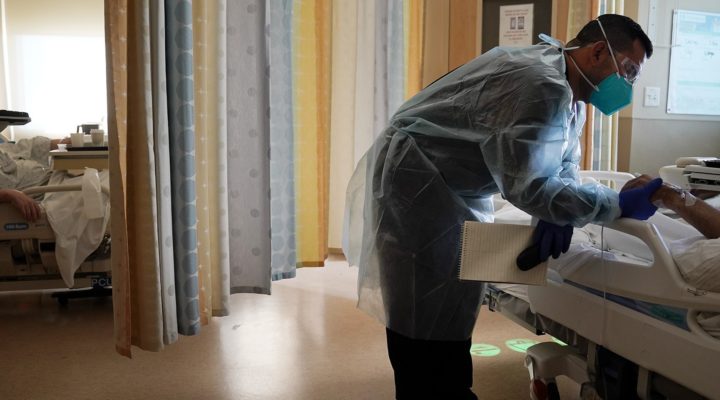The emotional trauma suffered by health care workers in the battle against COVID-19 also is being felt by the chaplains who ministered to the sick and dying during the pandemic.
“I think chaplains may have a little PTSD when this is all over,” said Grace Powell Freeman, a Cooperative Baptist Fellowship-endorsed senior chaplain at Emory St. Joseph Hospital in Atlanta. “I’ve been saying that if I can go through this, I can go through anything. This has been a real test of who I am.”
The virus that generated 32 million cases nationwide and to date has killed nearly 525,000 people pushed doctors and nurses to the limits of physical and emotional endurance, especially when the disease spiked during the closing months of 2020 and early 2021. That has been well documented.
Much of the emotional and spiritual support health care workers received during those traumatic periods derived from chaplains.
But much of the emotional and spiritual support health care workers received during those traumatic periods derived from chaplains who at the same time were tasked with ministering to families and their dying loved ones.
While the pandemic has ebbed and improvements in health care and chaplaincy procedures are emerging from the experience, going through the ordeal has been likened by some to serving in combat conditions.
“I find it helpful to see myself as a military chaplain rather than a hospital chaplain in the COVID-19 context,” Paul Yoon wrote in “Chaplains in the Midst of the COVID-19 Crisis,” an article published by the Association of Professional Chaplains.
“My role is a military chaplain in the health care context where all medical staff often express themselves to be soldiers fighting for their patients against COVID-19. My goals are to help these medical soldiers recharge, undo their anxiety and fear, and send them back to their battlefield,” Yoon wrote, but added: “I find the task of helping staff recharge to send them back to their patients or battlefield emotionally challenging.”

Chad Mustain
There was no aspect of caring for staff and families that wasn’t emotionally challenging, said Chad Mustain, a CBF-endorsed chaplain who serves in a large suburban hospital in the Dallas-Fort Worth area.
Part of his responsibility during the height of the outbreak was to provide care for the doctors, nurses and patient care technicians who worked directly with COVID-19 patients. In many cases he felt their anxiety.
“I can’t tell you the number of conversations where a nurse would come out of a patient’s room on the verge of tears or angry, just trying to hold it together,” he said.
Those encounters often followed a moment when the nurse had to hold an iPad in front of a dying patient while the family said goodbye on the screen. “They were just so frustrated or emotional, and they would say things like, ‘That’s the worst thing I ever had to do.’”
Mustain said he and his fellow chaplains experienced such scenes multiple times a day during the apex of the pandemic and had to keep it together until they could debrief with one another later in the day.
“Most COVID cases are horrendous and difficult because you’re dealing with such a hard death and the family is heartbroken and the staff are hurt and angry and upset,” he said. “And I go back to my office and just cry or just fume with anger at things that were said or done.”
One of the low points for Mustain occurred in December after helping a health care team reeling from the deaths of a husband and wife whose adult children also were hospitalized. Leaving the facility that night, he witnessed a protester outside berating staff and claiming the disease had been made up by liberals.
Leaving the facility that night, he witnessed a protester outside berating staff and claiming the disease had been made up by liberals.
“I was so angry as I was getting in my car that I shut my finger in the door. I still have a fingernail that’s healing and is a constant reminder of what was my lowest day, for sure.”
Freeman recalled the agony of standing outside dying patients’ rooms while assuring family by phone that their loved ones were receiving care. Equally painful was not being able to enter those rooms to comfort patients.

Grace Powell Freeman
“Some of my most significant moments came when I stood outside a glass door and put my hand on the door to offer a prayer, or when I would pray with that family on the phone and tell them I had prayed for their mother or father,” she said.
She vividly recalled speaking into intubated patients’ rooms through baby monitors donated for that purpose.
“I would say, ‘I don’t know if you can hear me, I am here to pray with you.’ And they would respond by holding up a hand to let you know they could hear you.”
Freeman said she endured the pandemic in part with the skills she and other chaplains learn to leave their stress at the office when they go home from work. “You learn how to just walk away from it and enjoy life and do the things you like to do.”
But that often was difficult during the worst parts of the outbreak, Freeman said, because the pool at her gym was closed. “When I could not use swimming to wash off the day, I quickly changed to sitting on my back porch and connecting with friends and family through Zoom.”
Mustain said daily debriefs of 5 to 30 minutes did a lot to help him through the trauma of COVID-19. The pandemic has done much to confirm the importance of therapy, getting exercise, eating right and other aspects of self-care, he added.
“If your theology doesn’t work at the bedside, you probably need to get a better theology.”
Another is being able to recommend steps to families, friends, patients and their families to make their hospital stays less difficult, a topic he covered in a Baptist News Global opinion piece in March. Those include bringing phone chargers, learning how to operate tablets and having do-not-resuscitate orders in place ahead of time.
And people should inspect their theology before health crises occur, he said.
“We have an old saying in chaplaincy: If your theology doesn’t work at the bedside, you probably need to get a better theology,” Mustain said. “‘Everything happens for a reason’ may sound good on a Sunday morning at your megachurch, but that will just fall apart when your loved one is in a room alone and the staff rolls in with an iPad so you can say goodbye.”


